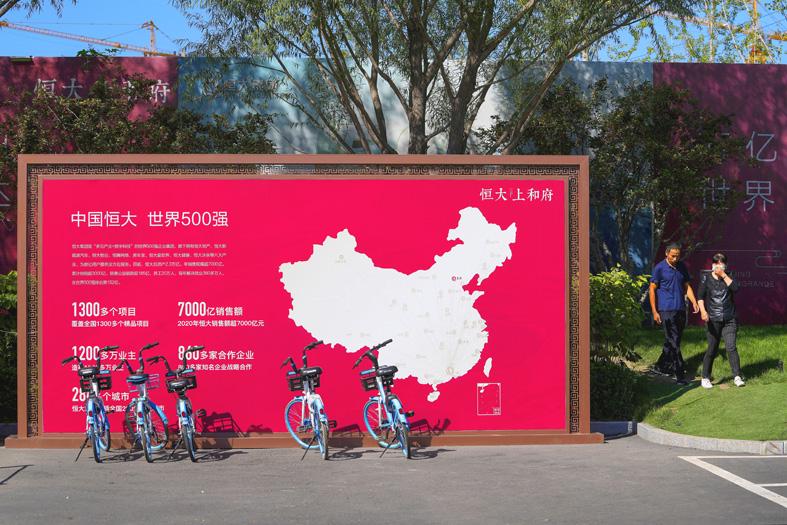China Evergrande Group (恆大集團), which is struggling under US$310 billion in debt, on Friday said that it might run out of money to “perform its financial obligations” sending Chinese regulators scrambling to reassure investors that China’s financial markets can be protected from a potential fallout.
Evergrande’s struggle to comply with official pressure to reduce debt has fueled anxiety that a possible default might trigger a financial crisis.
Economists say that global markets are unlikely to be affected, but banks and bondholders might suffer because Beijing wants to avoid a bailout.

Photo: AP
After reviewing Evergrande’s finances, “there is no guarantee that the group will have sufficient funds to continue to perform its financial obligations,” the company said in a Hong Kong Stock Exchange filing.
Shortly after the statement, regulators tried to soothe investor fears by issuing statements saying that China’s financial system was strong and that default rates are low.
They said that most developers are financially healthy and that Beijing would keep lending markets functioning.
“The spillover impact of the group’s risk events on the stable operation of the capital market is controllable,” the China Securities Regulatory Commission said on its Web site.
The Chinese central bank and bank regulator issued similar statements.
Evergrande — the global real-estate industry’s biggest debtor — owes 2 trillion yuan (US$313.7 billion), mostly to domestic banks and bond investors. It also owes US$19 billion to foreign bondholders.
The company, which has 2.3 trillion yuan in assets, has struggled to turn that into cash to pay bondholders and other creditors. It called off the US$2.6 billion sale of a stake in a subsidiary in October last year, because the buyer failed to follow through on its purchase.
Evergrande on Friday said it faces a demand to fulfill a US$260 million obligation.
If that obligation cannot be met, other creditors might demand repayment of debts earlier than normal, it added.
The company has missed deadlines to pay interest on some bonds, but made payments before a grace period ended and was declared in default.
Evergrande also said that some bondholders can choose to be paid by receiving apartments that are under construction.
Evergrande chairman Xu Jiayin (許家印) was on Friday summoned to meet with officials of Guangdong Province, a Chinese government statement said.
The statement said a government team would be tasked to help Evergrande oversee risk management.
Evergrande’s struggle has prompted warnings that a financial squeeze on real estate — an industry that propelled China’s explosive economic boom from 1998 to 2008 — could lead to trouble for banks, and an abrupt and politically dangerous collapse in growth.
The slowdown in construction helped depress China’s economic growth to an unexpectedly low 4.9 percent year-on-year in the three months ending in September.
Forecasters expect growth to decelerate further if financing curbs stay in place.

MULTIFACETED: A task force has analyzed possible scenarios and created responses to assist domestic industries in dealing with US tariffs, the economics minister said The Executive Yuan is tomorrow to announce countermeasures to US President Donald Trump’s planned reciprocal tariffs, although the details of the plan would not be made public until Monday next week, Minister of Economic Affairs J.W. Kuo (郭智輝) said yesterday. The Cabinet established an economic and trade task force in November last year to deal with US trade and tariff related issues, Kuo told reporters outside the legislature in Taipei. The task force has been analyzing and evaluating all kinds of scenarios to identify suitable responses and determine how best to assist domestic industries in managing the effects of Trump’s tariffs, he

TIGHT-LIPPED: UMC said it had no merger plans at the moment, after Nikkei Asia reported that the firm and GlobalFoundries were considering restarting merger talks United Microelectronics Corp (UMC, 聯電), the world’s No. 4 contract chipmaker, yesterday launched a new US$5 billion 12-inch chip factory in Singapore as part of its latest effort to diversify its manufacturing footprint amid growing geopolitical risks. The new factory, adjacent to UMC’s existing Singapore fab in the Pasir Res Wafer Fab Park, is scheduled to enter volume production next year, utilizing mature 22-nanometer and 28-nanometer process technologies, UMC said in a statement. The company plans to invest US$5 billion during the first phase of the new fab, which would have an installed capacity of 30,000 12-inch wafers per month, it said. The

Taiwan’s official purchasing managers’ index (PMI) last month rose 0.2 percentage points to 54.2, in a second consecutive month of expansion, thanks to front-loading demand intended to avoid potential US tariff hikes, the Chung-Hua Institution for Economic Research (CIER, 中華經濟研究院) said yesterday. While short-term demand appeared robust, uncertainties rose due to US President Donald Trump’s unpredictable trade policy, CIER president Lien Hsien-ming (連賢明) told a news conference in Taipei. Taiwan’s economy this year would be characterized by high-level fluctuations and the volatility would be wilder than most expect, Lien said Demand for electronics, particularly semiconductors, continues to benefit from US technology giants’ effort

‘SWASTICAR’: Tesla CEO Elon Musk’s close association with Donald Trump has prompted opponents to brand him a ‘Nazi’ and resulted in a dramatic drop in sales Demonstrators descended on Tesla Inc dealerships across the US, and in Europe and Canada on Saturday to protest company chief Elon Musk, who has amassed extraordinary power as a top adviser to US President Donald Trump. Waving signs with messages such as “Musk is stealing our money” and “Reclaim our country,” the protests largely took place peacefully following fiery episodes of vandalism on Tesla vehicles, dealerships and other facilities in recent weeks that US officials have denounced as terrorism. Hundreds rallied on Saturday outside the Tesla dealership in Manhattan. Some blasted Musk, the world’s richest man, while others demanded the shuttering of his